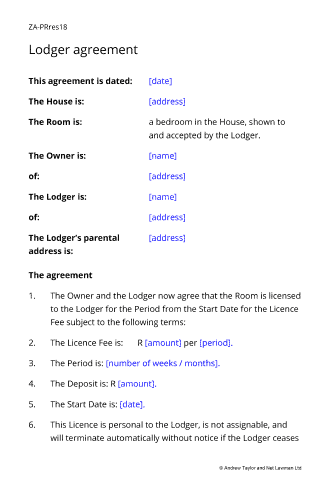Lodger agreement

Document overview


- Length:6 pages (1000 words)
- Available in:
 Microsoft Word DOCX
Microsoft Word DOCX Apple Pages
Apple Pages RTF
RTF

If the document isn’t right for your circumstances for any reason, just tell us and we’ll refund you in full immediately.

We avoid legal terminology unless necessary. Plain English makes our documents easy to understand, easy to edit and more likely to be accepted.

You don’t need legal knowledge to use our documents. We explain what to edit and how in the guidance notes included at the end of the document.

Email us with questions about editing your document. Use our Lawyer Assist service if you’d like our legal team to check your document will do as you intend.

Our documents comply with the latest relevant law. Our lawyers regularly review how new law affects each document in our library.
About this lodger agreement
This document grants permission to one or more people to occupy a room in your home under the terms agreed.
There is no requirement to have a formal written legal agreement with your lodger, but having one clarifies what the lodger can expect in the arrangement, and provides a reference point should any dispute occur in the future.
Whether you’re renting a room to a friend for a month or two, or wanting a long term lodger, there are practical and legal advantages of having the rental terms in writing.
The law relating to this document
In legal terminology, this document is called "a licence to occupy" and gives a lodger permission to live in a property without creating a tenancy.
If you are taking a lodger in as a flat or house mate, this is the document you should use. We recommend granting a licence on a short-term basis (less than 12 months) and renewing it when it expires.
When to use this licence
This lodger agreement would most commonly be used in the following circumstances:
- A property owner renting out a spare bedroom (to a stranger, a friend, or a couple)
- A student owner landlord renting spare rooms in a property to other students
It is suitable for any type of property: flats or houses, and can be used to let more than one room in the same property. You can reuse it for subsequent lodgers.
You can also use this agreement to sub-let a room if you rent under a tenancy agreement (subject to your tenancy agreement allowing sub-letting) and subject to someone on the original tenancy agreement still living at the address.
The document is not suitable if:
- The lodger will run a business from the property
- The lodger will occupy the whole property and the landlord lives elsewhere
- The lodger will only live in the property on a part time basis (use a part time lodger agreement)
Some helpful and practical pointers for lodger agreements
Mentioned in the help notes to this document (along with others) are the following pointers:
- Taking a deposit (a bond) can be done (and is covered in this agreement) but we advise that if you can avoid doing so, you should. A court may see a deposit as pointing toward this arrangement being a tenancy.
- Work in to your agreement the right for you to enter the room rented to your lodger at any time. Although this needs to be done discretely, avoiding giving the lodger exclusive occupation of the property helps identify your arrangement as a licence rather than a tenancy.
- Living with a lodger can be less pleasant once you’ve given him or her notice. Consider a short term. The expectation of a short arrangement will make giving notice easier (e.g. you can mention that you don’t plan to renew, rather than that you want your lodger to leave).
Agreement features and contents
- Includes sensible, practical provisions to protect the landlord’s interests
- Full description of the property and the services that the lodger should expect to receive
- All likely provisions for restrictions on what the lodger may do in the property
- Rent period and amount

Recent reviews
Thank you very much!
Choose the level of support you need
Document Only
This document
Detailed guidance notes explaining how to edit each paragraph
Lawyer Assist
This document
Detailed guidance notes explaining how to edit each paragraph
Unlimited email support - ask our legal team any question related to completing the document
- Review of your edited document by our legal team including:
- reporting on whether your changes comply with the law
- answering your questions about how to word a new clause or achieve an outcome
- checking that your use of defined terms is correct and consistent
- correcting spelling mistakes
- reformatting the document ready to sign
All rights reserved
